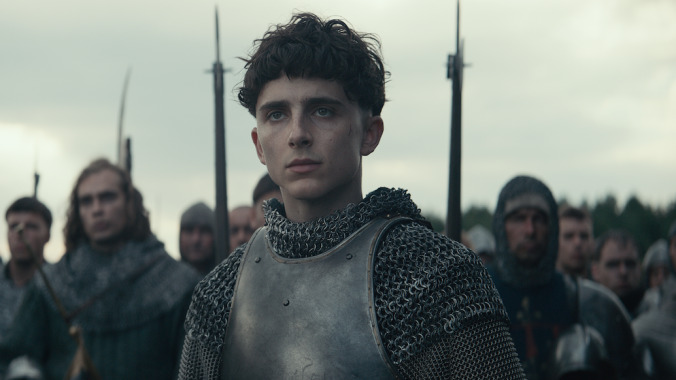Timothée Chalamet doesn’t want to be The King—and who would, in a kingdom this dull?


If there’s a discernible hook to the turgidly familiar historical epic The King, it’s that Timothée Chalamet, heartthrob of the A24 scene, does not look like he wants to appear in a historical epic. This doesn’t undermine his character. Hal, soon to be known as Henry V, is wholly uninterested in the maneuverings of his father, King Henry IV (Ben Mendelsohn), and chooses to live as a 15th-century partier, hitting the (muddy) town with his ex-soldier buddy Falstaff (Joel Edgerton). When a girl calls young Hal “your highness” in bed, he gets pensive, reminded of the bloodline he’d prefer to ignore. His unwanted family catches up with him when circumstances dictate that he must nonetheless ascend to the throne.
The King’s story of Hal navigating through his newfound authority and military powers is an odd mishmash. It’s not technically an adaptation of Shakespeare’s Henriad plays (the Bard, apparently unprotected by the WGA, receives no onscreen credit), but it’s hard to imagine that it would exist without the literary ancestry. Even its departures from Henry IV and its ilk feel like pointed changes to Shakespeare more than re-interpretations of history.
Director David Michôd smoothes over the history-literature wrinkles with the same old contemporary period-piece aesthetics: Much of the movie is desaturated and chainmail-gray, trying to sap the glamour out of palace intrigue and large-scale violence while nonetheless saving its modest visual lyricism for a few sequences of, yes, large-scale violence, like the firebombing of a French castle that’s far prettier than anything else in the film. It’s a choice that pairs well with Chalamet’s Hal, who’s both disgusted by war and also a stronger, savvier, and more badass fighter than his “soft, but eager” brother, Thomas (Dean-Charles Chapman)—a tired dramatic irony that Chalamet and Michôd fail to enliven, and instead use to glorify their abstractly tortured lead.
This dead end of characterization may also be Joel Edgerton’s fault, in part because he co-wrote the screenplay with Michôd and in part because he plays Hal’s sometime ally Falstaff with a similar contradiction and a lot more charisma, upstaging the guy he sidekicks for. Less comic than the Shakespeare version, this Falstaff is a battle-honed warrior who is also weary and wary of what this has cost him. The movie is most interesting when it delves into the friendship between Hal and Falstaff, and how Hal’s ascent to power affects it. Their bond strains when Hal feels that he must protect himself, often at the urging of his advisor William (Sean Harris, whose slithery voice perhaps flags his intentions too early in the picture).
Edgerton gives the most compelling and grounded performance, acting as a counterweight to the movie’s lineup of expert supporting scenery-chewers, who collectively suggest a kind of sneering moral rot that overtakes the royal and powerful. Early on, there’s Mendelsohn grimacing in disgust before Henry IV succumbs to illness; later, there’s a delightfully hammy Robert Pattinson as the Dauphin Of France, who faces off with Henry V at the Battle Of Agincourt. Chalamet restrains himself admirably in scenes where the young French-American actor has to speak in a British accent opposite the British Pattison spitting out French-accented English (a “simple and ugly” language, in his judgment), but he remains in sync with the movie’s dithering approach to the material. Chalamet and the movie are both too respectable to relish the pulpiness, and both lack the psychological acuity necessary for all of this to work on more serious terms.
The middling respectability of The King doesn’t preclude it from some flashes of life. Michôd finds novelty in his staging of The Battle Of Agincourt, with both sides’ soldiers smushed together in such a close-quarters scrum that at times they barely look capable of moving. They need to thin their ranks just to make room for the standard punishing death blows, and when Hal gets some breathing room, the camera stays on him as he scraps his way through the carnage. But it’s hard to feel energized by a historical epic finding a couple of ways to look cool for a few minutes at a time. Most of The King is just unadorned semi-prestige, with a few gruesome severed heads rolling around for cred.